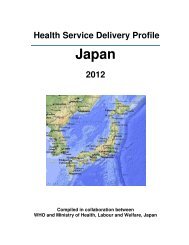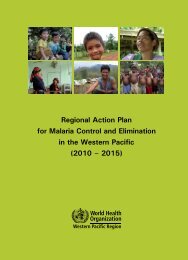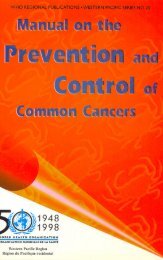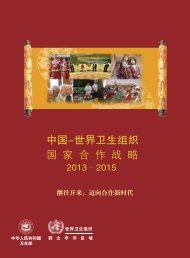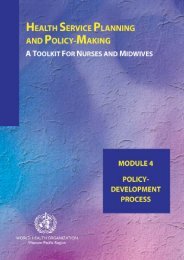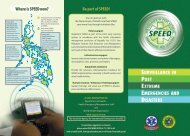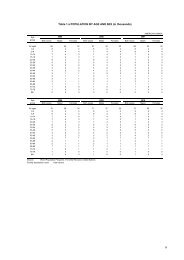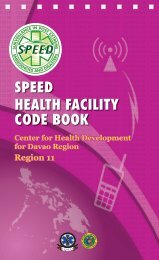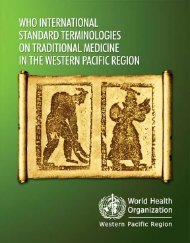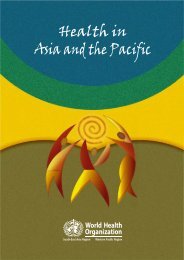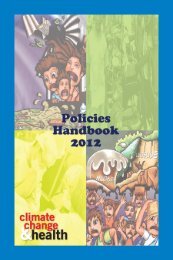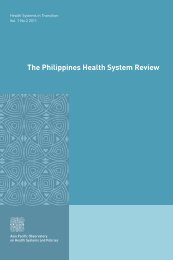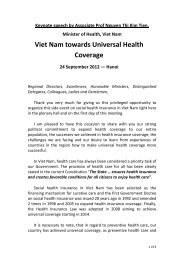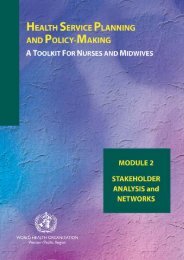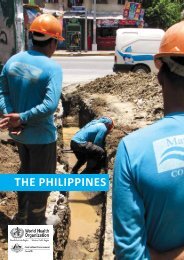monitoring of the who global code of practice on the international ...
monitoring of the who global code of practice on the international ...
monitoring of the who global code of practice on the international ...
Create successful ePaper yourself
Turn your PDF publications into a flip-book with our unique Google optimized e-Paper software.
Philippine Overseas Labor Offices (POLOs), <str<strong>on</strong>g>the</str<strong>on</strong>g> Overseas Workers Welfare Administrati<strong>on</strong><br />
(OWWA), and <str<strong>on</strong>g>the</str<strong>on</strong>g> PRC, respectively oversee procedures for Filipino migrant health workers<br />
and hiring/recruitment agencies, such as in securing appropriate employment permit, visa,<br />
and special permit to <str<strong>on</strong>g>practice</str<strong>on</strong>g> pr<str<strong>on</strong>g>of</str<strong>on</strong>g>essi<strong>on</strong>. O<str<strong>on</strong>g>the</str<strong>on</strong>g>r mechanismsare bilateral agreements with<br />
specific stipulati<strong>on</strong>s with regard to migrant health pr<str<strong>on</strong>g>of</str<strong>on</strong>g>essi<strong>on</strong>als, such as <str<strong>on</strong>g>the</str<strong>on</strong>g> Philippine-‐Japan<br />
Ec<strong>on</strong>omic PartnershipAgreement (PJEPA), ASEAN-‐Australia-‐New Zealand Free Trade<br />
Agreement (AANZFTA), and <str<strong>on</strong>g>the</str<strong>on</strong>g> Recruitment Agreement between <str<strong>on</strong>g>the</str<strong>on</strong>g> Government <str<strong>on</strong>g>of</str<strong>on</strong>g> <str<strong>on</strong>g>the</str<strong>on</strong>g><br />
Philippines-‐United Kingdom <str<strong>on</strong>g>of</str<strong>on</strong>g> Great Britain and Nor<str<strong>on</strong>g>the</str<strong>on</strong>g>rn Ireland. However, despite<br />
government agreements <strong>on</strong> initial requirements necessary to <str<strong>on</strong>g>practice</str<strong>on</strong>g> in a given country,<br />
<str<strong>on</strong>g>the</str<strong>on</strong>g>re have been instances when Filipino migrant health pr<str<strong>on</strong>g>of</str<strong>on</strong>g>essi<strong>on</strong>als have had to comply<br />
with additi<strong>on</strong>al requirements that are not necessarily initially stipulated in <str<strong>on</strong>g>the</str<strong>on</strong>g>ir c<strong>on</strong>tracts.<br />
In Philippine hospitals, <str<strong>on</strong>g>the</str<strong>on</strong>g>re are foreign health pr<str<strong>on</strong>g>of</str<strong>on</strong>g>essi<strong>on</strong>als that come to <str<strong>on</strong>g>the</str<strong>on</strong>g> Philippines to<br />
be residents, trainees, administrators, or researchers, teachers or practi<strong>on</strong>ers in <str<strong>on</strong>g>the</str<strong>on</strong>g> c<strong>on</strong>text<br />
<str<strong>on</strong>g>of</str<strong>on</strong>g> medical missi<strong>on</strong>s.These foreign health pr<str<strong>on</strong>g>of</str<strong>on</strong>g>essi<strong>on</strong>als are compliant with <str<strong>on</strong>g>the</str<strong>on</strong>g> rules <str<strong>on</strong>g>of</str<strong>on</strong>g> <str<strong>on</strong>g>the</str<strong>on</strong>g><br />
PRC, <str<strong>on</strong>g>the</str<strong>on</strong>g> Civil Service Commissi<strong>on</strong> (CSC), and <str<strong>on</strong>g>the</str<strong>on</strong>g> Bureau <str<strong>on</strong>g>of</str<strong>on</strong>g> Immigrati<strong>on</strong> (BI).<br />
O<str<strong>on</strong>g>the</str<strong>on</strong>g>r legal mechanism menti<strong>on</strong>ed by <str<strong>on</strong>g>the</str<strong>on</strong>g> health pr<str<strong>on</strong>g>of</str<strong>on</strong>g>essi<strong>on</strong>al associati<strong>on</strong>s emphasized <str<strong>on</strong>g>the</str<strong>on</strong>g><br />
provisi<strong>on</strong>s <str<strong>on</strong>g>of</str<strong>on</strong>g>various Memorandum <str<strong>on</strong>g>of</str<strong>on</strong>g> Agreement (MoA) and <str<strong>on</strong>g>the</str<strong>on</strong>g> regulati<strong>on</strong>s <str<strong>on</strong>g>of</str<strong>on</strong>g> <str<strong>on</strong>g>the</str<strong>on</strong>g> DOH and<br />
PRC that serve asguides for <str<strong>on</strong>g>the</str<strong>on</strong>g> c<strong>on</strong>duct <str<strong>on</strong>g>of</str<strong>on</strong>g> medical missi<strong>on</strong>s in <str<strong>on</strong>g>the</str<strong>on</strong>g> country by foreign health<br />
pr<str<strong>on</strong>g>of</str<strong>on</strong>g>essi<strong>on</strong>als. In <str<strong>on</strong>g>the</str<strong>on</strong>g>ir view, since <str<strong>on</strong>g>the</str<strong>on</strong>g> Code’s provisi<strong>on</strong>s have yet to befully implemented in<br />
<str<strong>on</strong>g>the</str<strong>on</strong>g> Philippines,mechanisms needed to be in place cannot still be appreciated.<br />
C<strong>on</strong>sidering <str<strong>on</strong>g>the</str<strong>on</strong>g> Philippines as a sending country <str<strong>on</strong>g>of</str<strong>on</strong>g> health pr<str<strong>on</strong>g>of</str<strong>on</strong>g>essi<strong>on</strong>als, this WHO<br />
<str<strong>on</strong>g>m<strong>on</strong>itoring</str<strong>on</strong>g> item is not applicable according to recruitment agencies. However, c<strong>on</strong>sidering<br />
varying nati<strong>on</strong>al situati<strong>on</strong>s, recruiters referred to labor laws in receiving countries as legal<br />
mechanisms that promote <str<strong>on</strong>g>the</str<strong>on</strong>g> protecti<strong>on</strong> <str<strong>on</strong>g>of</str<strong>on</strong>g> Filipino migrants, such as in <str<strong>on</strong>g>the</str<strong>on</strong>g> United States <str<strong>on</strong>g>of</str<strong>on</strong>g><br />
America. The POEA provides legal mechanisms and attempt to adopt prevailing wage rates<br />
in receiving countries to ensure protecti<strong>on</strong> <str<strong>on</strong>g>of</str<strong>on</strong>g> Filipino migrant workers.<br />
Trade uni<strong>on</strong>s represented in <str<strong>on</strong>g>the</str<strong>on</strong>g> workshop cited RA 8042 as amended by RA 10022(Secti<strong>on</strong><br />
4), “whereby <str<strong>on</strong>g>the</str<strong>on</strong>g> State shall deploy OFWs (Overseas Filipino Workers) <strong>on</strong>ly in countries<br />
where <str<strong>on</strong>g>the</str<strong>on</strong>g> rights <str<strong>on</strong>g>of</str<strong>on</strong>g> Filipno migrant workers are protected.” Most Filipino health pers<strong>on</strong>nel<br />
migrate due to limited opti<strong>on</strong>s for local employment. Their local educati<strong>on</strong> and training are<br />
not directly accredited in receiving countries in order to qualify for work abroad. Filipino<br />
migrant health workers are reportedly discriminated because <str<strong>on</strong>g>the</str<strong>on</strong>g>y do not receive <str<strong>on</strong>g>the</str<strong>on</strong>g> same<br />
remunerati<strong>on</strong> (as nati<strong>on</strong>als <str<strong>on</strong>g>of</str<strong>on</strong>g> o<str<strong>on</strong>g>the</str<strong>on</strong>g>r countries) and encounter difficulty in getting promoted<br />
in <str<strong>on</strong>g>the</str<strong>on</strong>g> receiving country. For instance, Filipino pharmacists need to have a post-‐graduate<br />
degree to be hired as pharmacists in <str<strong>on</strong>g>the</str<strong>on</strong>g> Middle East; o<str<strong>on</strong>g>the</str<strong>on</strong>g>rwise, <str<strong>on</strong>g>the</str<strong>on</strong>g>y are hired as pharmacy<br />
assistants. Trade uni<strong>on</strong>s raised <str<strong>on</strong>g>the</str<strong>on</strong>g> need to streng<str<strong>on</strong>g>the</str<strong>on</strong>g>n <str<strong>on</strong>g>the</str<strong>on</strong>g> <str<strong>on</strong>g>m<strong>on</strong>itoring</str<strong>on</strong>g> <str<strong>on</strong>g>of</str<strong>on</strong>g> Pre-‐Departure<br />
Orientati<strong>on</strong> Seminars (PDOS) by <str<strong>on</strong>g>the</str<strong>on</strong>g> OWWA, and Pre-‐Employment Orientati<strong>on</strong> Seminars<br />
(PEOS) by <str<strong>on</strong>g>the</str<strong>on</strong>g> POEA, aimed at helping workers understand <str<strong>on</strong>g>the</str<strong>on</strong>g>ir rights and privileges in<br />
receiving countries.<br />
3. Evidence <str<strong>on</strong>g>of</str<strong>on</strong>g> legal mechanisms<br />
9



